Hi everyone,
My name is Shannon and I'm an audio engineer and would like to blog about a whole variety of things we do in music behind the scenes. You can see my intro blog on my page (https://steemit.com/introducemyself/@audio-nrg/introducing-me). Im particularly interested in providing info for people who are new to using recording set ups and devices at home and wanting to learn more about recording software and hardware, maybe dispell some product myths and provide techniques for you to practice for better production sound. I will provide a summary of all this info at the bottom of this blog
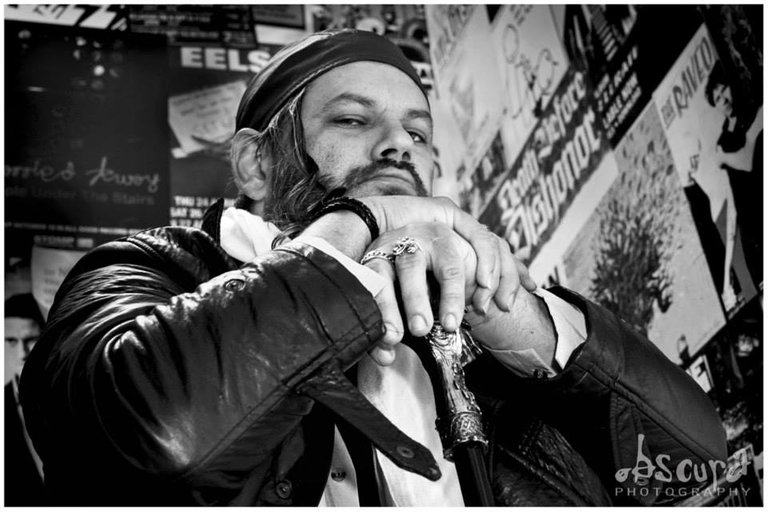
So lets start at the beginning and cover some hardware that you need when you want to record on your home computer.
Software:
Digital recording software is often referred to as a DAW (digital audio workstation) and there are a number of software applications that are very popular these days and have come a long way since the early turn of the decade from the late 90's to 2000s. My first software was called 'databecker' and i bought this around 2001 for about $100. it was a basic interface with about 24 tracks i think, and over 100 midi tracks. With this software i made some very basic demo's with a drum machine recorded in as audio, some vocals and a few guitar tracks and 1 bass track. At the time i had no idea what i was doing and how to do it but just worked my way through, read lots of guides and played around with it. Bear in mind, the internet in Australia was only just taking off and Mp3 files were still new technology.
here is the old databecker interface..
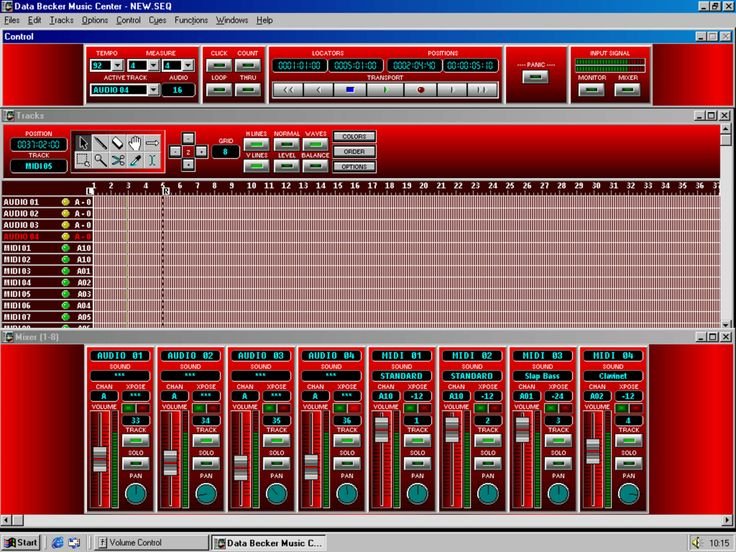
The interface of most software hasn't changed much since then, but the capabilities of both the software and the computer hardware has grown massively. When i recorded with databecker i didn't even have a audio interface, i just recorded through the computer and it was a little slow and a bit of latency, but i found how to fix that for a better result. So what are the popular software choices now days? it really depends on what type of music you make but generally the popular products are Protools, Ableton, Logic, Cubase, garage band on mac (more basic but still used in the home studio) and perhaps fruity loops.
The industry standard has been Protools for many years now and is a very good interface to get used to. It has broad features (its user manual is over 1200 pages!) and i use it as my primary software as i had to use it at college the majority of the time. Protools has 2 interfaces, the standard Protools and Protools HD. The latest release is 12.8 but Im sitting happy on 12.5 at the moment. Protools standard has plenty of features in the full version such as unlimited tracks and online services such as collaborating with others online. There are plenty of plugins that come with it as well. i will discuss plugins in a later blog but for now, they are basically tools to help you produce your music such as virtual instruments and EQ or compressors and other tools.
Below is an image of the Protools windows overlapping.
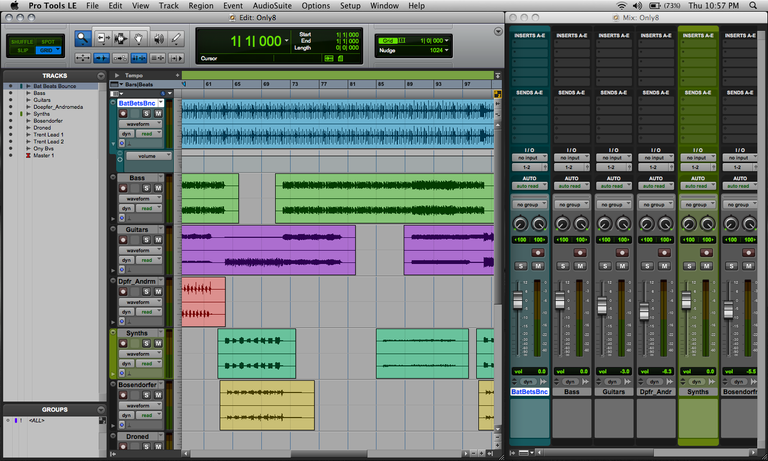
The next DAW is Ableton. This DAW is very versatile and used alot with Dj's and other hiphop and beats producers. It makes a awesome final mix down when used correctly and your track is balanced. Ableton has a lot of fantastic tools and an interface that is very unique and versatile. Basically one window is a general tracking window where you can view your recording as it captures the live audio wave or if you want to write in midi notes and audio samples. The second window has your mixing channels and also has a large number of tracks that allow you too play live and loop samples from the window.
Personally i find Ableton a little more challanging to use but only because i don't spend alot of time with it, but i have it if needed. The tools available on this DAW allow a great deal of sound design options and manipulation by the producer/musician or sound designer, such as the ability to time stretch and warp your samples, good pitch bending and bit crunching tools and there are many more for free. You can also download live set up templates from pro Dj's, and one guy worth mentioning here is New Zealand Ableton pro, Tom Cosm and you can find him on youtube. So ableton is a great DAW but may not be suitable for the new acoustic musician who is not interested in manipulating their tunes.
here is an example of the Ableton interface, its a little more siple in design but an awesome piece of software for any kind of recording.

You can search more about the other above mentioned software DAW's and Logic is becoming quite popular among professional composers over protools as its interface is more simple and clean cut, its more similar to Cubase in appearance and if you are a sound designer/composer Logic pro may be more your style, i am certainly curious to look at this DAW myself.
But whatever choice you make you need to make sure your computer is able to handle the load from additional software you may need to use with it. Most of the software websites will provide you with a detail of system requirements. The reason of this importance is that the general DAW software doesn't use alot of your PC power, but VST instruments (virtual computer driven sound sample instruments controlled by midi devices) WILL take a heavy load of your processing power and can slow down your pc or could even just stall it. To avoid this, the best option is our next piece of equipment.. your sound card!
Sound Cards:
What is this? perhaps the most important and central piece of hardware you need when recording. A sound card device allows your recorded audio to pass from your instrument to your computer and back out through the speakers. It allows the recorded audio (or VST sound sample) to play back at proper speed while you live record to other tracks or even on its own. But it also allows your computer to receive the audio information to be processed from a sound wave to a digital signal and back out to your speaker as a i mentioned earlier. This means that the computer has to convert an acoustic wave form into a digital data form and back at very high speed and at a good quality.
This conversion is referred to as AD/DA or Analogue to Digit -Digital to Analogue conversion (this is not to be confused with ADAT devices). So the best thing to use is an external sound card or an Audio interface. I have used a few different ones, and currently use a Roland Octa-Capture (see below)
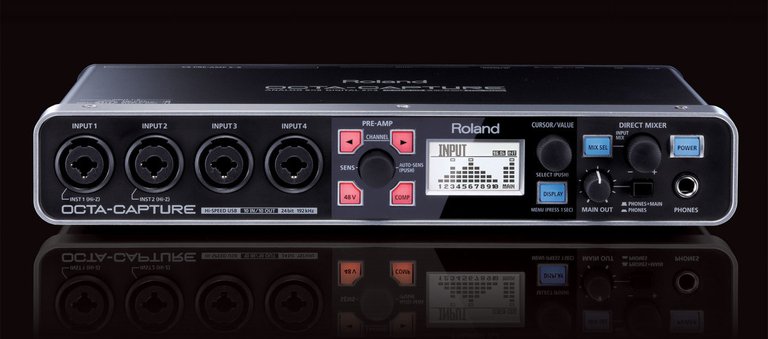
Now, these devices vary in price and this is because of the difference in what is called 'pre-amps' within the device. A pre-amp is a part of the device that recieves the audio and and allows the signal to be boosted or made stronger (not actually louder but it presents louder to our aural perception). The pre-amp is very important because they are often considered to shape the sound of the audio going in and generally the desired goal is to get a warmer analogue sound. what does that mean? well without going off on another tangent, an acoustic sound wave that is converted into digital is considered to loose some of its natural harmonic and tonal qualities especially when recording acoustic instruments. The use of good transformers and other tech bits inside the pre-amp allows the device to recreate the sound image as naturally as possible. This also relies on what is called the 'bit rate' in the AD/DA converter. The higher the bit rate the better the recording quality. for instance, the bit rate of CD quality is 16bit/p sec @ 44.1kHz. For film the recording rate is higher, 24bit/48Khz. All this stuff simply means that the higher the bit rate, the more samples per second are captured by the converters in your sound card at a greater band width giving you better quality recordings.
The more common brands of audio interfaces (and affordable) are TASCAM, Roland, M-Audio (Avid/protools) Focusrite, Presonus, Apogee, UAudio (Universal audio more expensive). i have put a few pics of these below, but if you are starting out and are a single musician or duo group and want to record some basic demos, just look for something with 2-4 inputs, for mics, these may not have midi in/outs either because they are low on the retail scale at a few hundred bucks or less depending where you are. If you have a band, a good buy is commonly the focusrite scarlet 18i20 or something around that size allowing your plenty of IN's for recording a drum kit or larger groups live etc. just be aware that some DAW's may have minor problems with the choice of interface you choose, like my Roland does with protools, but you can get around these and Protools is generally a pain in the butt with anything that is not manufactured by them. Most interfaces use USB connections or thunderbolt for more expensive devices.
Small single musician interfaces:
Tascam work well with most DAWs no problem and are very reliable:

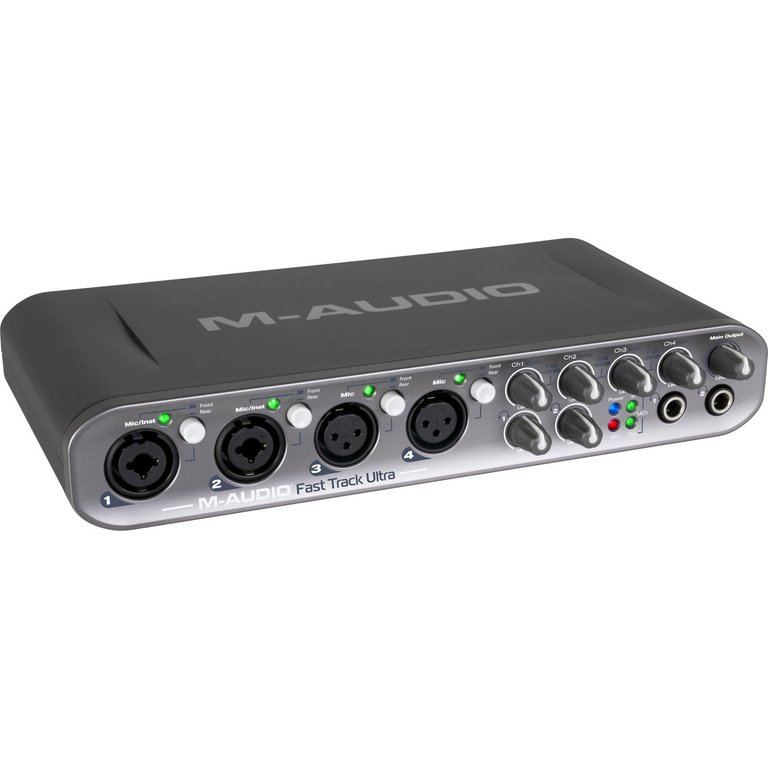


Here is the Focusrite Scarlett 18i20 for bands and larger groups, they have a good reputation for their preamps too:

OK, so lets summarize the info above for now:
to get recording we need some software for our computer (PC/MAC they are all compliant)
- Protools the professional music industry stadard (purchased online and can be downloaded, they are up to date with Windows 10 but be aware that some 3rd party plugins you buy may not be) full standard version has plenty of feature and is pretty easy to learn with good basic short cuts.
-Ableton - Software more suited for Dj's and Beats producers or even sound designers who like twisting and manipulating sound. you can get lots of cheap or free templates with samples, has lots of tools to use or you can download free stuff and use it. a little harder to get used to but does have an original and very effective mix window feature.
Logic Pro - a nice looking GUI for the user, a cross between fruity loops and cubase in its design, more suited for the composer to design various orchestral compositions, and is getting more popular due to these features.
Cubase, very stable software, i used it for years before Protools, still a little generic looking but the end mixes can sound very good, they seem to be struggling in the market lately but they are a very good interface and compliant with many external sound cards, pretty easy to use and get use to as well. cheap to buy the lower entry level software as well! a great starter software and is versitile.
Fruity Loops, haven't used this much but a a good starter for new music beat producers to get use to how the DAW software works. Mainly used for electronic and hip hop and still very popular among many electronic artists but im not sure if it really has the same versatility as Ableton.
HARDWARE:
you need a sound card for recording and playback of larger VST and Midi based music creation. If you are a single musician and want to record a few vocal and guitar tracks or demo's you can just get a basic 2 track focusrite or something, but i would encourage at least for IN's and perhaps one with midi in as well, you may appreciate it in the long run if you end up working with others.
Look for a interface that has multiple bit rate options. The smaller ones may only do 16bit 44.1 and may not even have 24 bit capability. This detail is important to consider when you buy, or your music won't playback properly.
you may also want to look at an ASIO driver, this software is free and very small to down load, it works well with most interfaces as well.
Well, that's it for Part one and we have really only scratched the surface, but in part two we will look at Microphone selections and how to set them up! cheers for now and i hope this was easy to follow and understand, some techy things can be confusing but i will always try to explain as best i can. If you want more you can go to my YouTube Channel audionrg for videos and subscribe too! i would love to have you on board. you can also give my FB page a like and follow too,
Thanks everyone and bye for now!
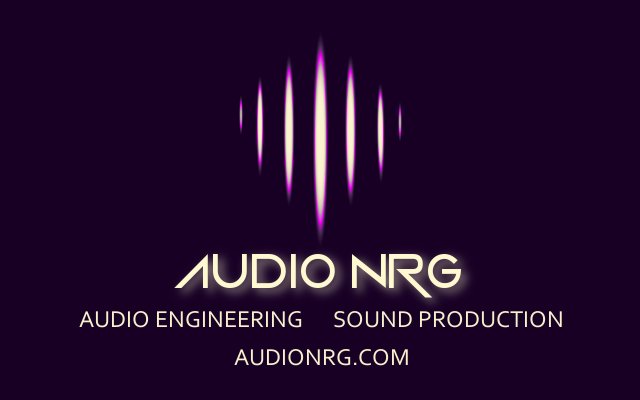
great article man . I used ableton and some other softwares but the cool UI is FL Studio as I see that everything is in hand , but in must of softwares , functions are just not in the right places.
hi david,
Thanks for the feedback, yea i haven't used FL much at all but i have some friends who do and like it alot. i like PT because its pretty much set up like a sound desk and the flow even with busses and other channels in things are good and easy to work with. Each DAW has its benefits and i think it comes down to personal preference, and the intention of design by the manufacturers. i used to be good with cubase but tried it recently and just got frustrated haha, but i don't use it much anymore cuz PT does what i need and i know it pretty well now.
Its nice to meet you
regards
Shan the sound man
thank you so much Shan , it's nice to meet you , I also used Pro Tools , but I didn't checked the last version , It must be better than before , I am agree with you , I think the best software is the one that engineer is relax with it and also it depends on the engineer and the one who do the mix and master , I saw some people say , no FL studio is not good or all softwares are useless just Cubase is good or ... but I think they just didn't used or didn't learnt the other softwares. also I think if we know the tools and stuffs and how to mix and master a song and if we know console and how to work with it , then there is no problem for us , we can do the bests in any software , but as I said The best software is the one which is easy to use , we don't want something like a Programming software ( C++ or C# or Java ) we need easy UI.
I am really glad to meet you
be in contact Shan
best wishes for you
Davood Faramarzi ( @Davidfar )
Yes, you're right, and it takes time to learn one software well rather than use many and not know much about any of them. One secret is to play with about 2-3 and learn 5 short cuts in each one and it helps. after a while the engineer notices that all software has very similar features and each one has a certain strengths. getting the best from those strengths is 1 key to versatility in poroductions.
cheers mate!
I like Ableton Live's Effects , one of the great thing ableton has.
Nice post.
Hi there,
Thanks, i hope it will be of help to people. nice to meet you!
regards
Shan the sound man
welcome to steemit.I hope you are enjoying this great platform.
I have followed you.Please follow me @magneticvibes